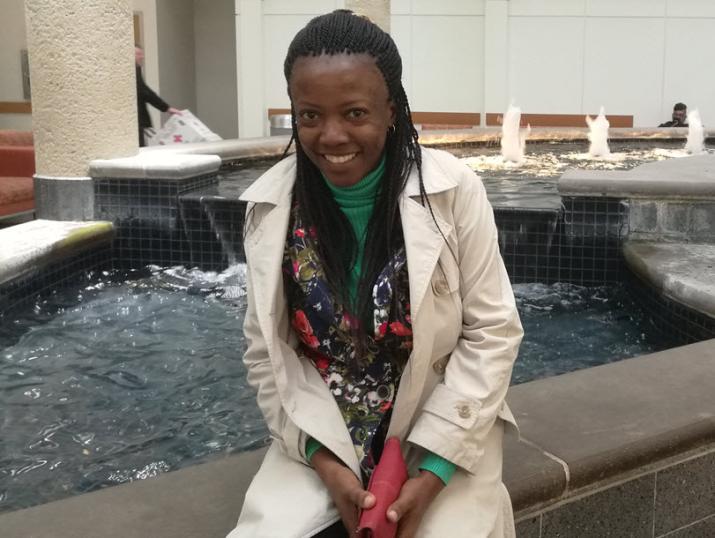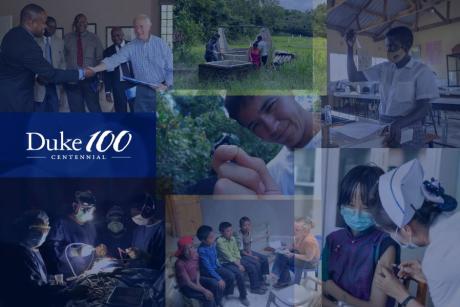Duke University has partnered with the Kilimanjaro Christian Medical Center (KCMC) in Moshi, Tanzania, for more than 20 years, with a focus on strengthening medical education and building medical research capacity. For the last ten of those years, Vera Wright has been coordinating nearly all affairs related to the placement of Duke faculty members, residents and students who come to KCMC for research collaboration. Sarah Cao, assistant director for international operations at the Duke Global Health Institute, can’t speak highly enough of her contributions to the success of the partnership. “I always say, ‘She runs Moshi,’” Cao joked.
Wright recently visited Duke for the first time, and we had the pleasure of talking with her about her experience working in this behind-the-scenes, yet absolutely essential, role in the partnership.
DGHI: What do you do at KCMC?
MRS. WRIGHT: I start each day by checking emails, because most of the communication between Duke and KCMC is through email. A lot of my work involves things like helping faculty renew their licenses and helping students, residents and faculty take care of logistical arrangements for coming to Moshi—such as looking for their accommodations and slots for their placements within KCMC, other local institutions or rural hospitals. Sometimes I have to go to government offices, like immigration or the Medical Council to follow up on some of the licenses that are needed. Sometimes we have big meetings, and with those, I prepare the minutes and make sure everything is going smoothly.
DGHI: How did you get involved in the partnership?
MRS. WRIGHT: Previously, I was working part-time with the International School Moshi. In that school, they also have many international students. I was looking for a full-time position, and the announcement for this job came up, and it matched a lot with what I was doing, so I applied for it.
DGHI: What’s an example of something you do behind the scenes to make sure things run smoothly that other people probably don’t see or appreciate?
MRS. WRIGHT: When a faculty member or resident is coming to Moshi, and I only have two or three months’ notice, it can make things complicated. Before they land in Tanzania, they may need three or four different kinds of permits, and each one may depend on another one. I have to run out quickly to make sure we have everything in place before each person arrives. But that doesn’t happen as often now that I’ve created standard operating procedures and shared them with the coordinators at Duke.
DGHI: What do you like most about your work?
MRS. WRIGHT: It connects me with people. I work with almost all of the heads of departments at KCMC, leaders of rural hospitals and government officials. I feel privileged to know those kinds of people.
DGHI: What was your most memorable experience while working for the partnership?
MRS. WRIGHT: The thing I won’t forget was the visit by [former Duke] President Brodhead in 2011, because it gave us the chance to show him and the other visitors how DGHI has helped the Moshi community. And the visit by the Gorrie family last year was also a big thing, because when you go there and you hear from people and see the things that have been done, it makes a huge difference to our funders. So we were very happy to host them.
DGHI: What do you see as the most exciting aspect of the work between Duke and KCMC?
MRS. WRIGHT: When these residents and students come to Moshi, not only are they learning about tropical diseases and the Tanzanian culture, but also they bring with them something new, which people in Moshi appreciate. I hope this partnership continues to grow.
DGHI: What do you think makes the Duke-KCMC partnership successful?
MRS. WRIGHT: I think the management and the good communication with the special leadership of Professor John Bartlett. We have the team we’re communicating with at Duke, and then we have the team at KCMC. Some of the Duke faculty have been working and living in Moshi for a long time, so that helps a lot. If I need help figuring something out, I can easily ask one of the faculty members, and they are very helpful.
DGHI: What is it like to visit Duke for the first time after 10 years with the partnership?
MRS. WRIGHT: I feel like Duke is part of my family, so I’m very happy to be here. It’s a big privilege. There are many people I’ve been emailing for a long time, and you think, “Oh, I know this person,” but it’s only through email. So now, to put faces to names, it makes a huge difference.
DGHI: What’s one thing you think people should know about Tanzania?
MRS. WRIGHT: My country is one of the most peaceful countries. It’s very nice, especially Moshi. It’s very friendly and welcoming, and lots of people want to help others.There are also a lot of interesting things to do, especially for those who have never been to Africa. I recommend that people visit the national parks and the Usambara Mountains and climb Mount Kilimanjaro if they can. I tell people “please come,” because I don’t think the news gives an accurate portrayal of Africa, and visiting my country will help them see what it’s really like.
Learn more about DGHI’s partnership with KCMC.



